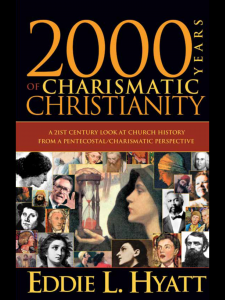2000 Years of Charismatic Christianity by Eddie L. Hyatt
In 2000 Years of Charismatic Christianity Eddie L. Hyatt highlights a segment of the Church that has largely fallen by the wayside. Yet, this is the first time I have reviewed a book that I do not wholeheartedly recommend to everyone, but not because I didn’t like it or disagreed with the author’s thesis. It certainly served the purpose for which I purchased it and if you share my interest, I can recommend it to you. For several months prior to purchasing it I had been wondering what happened to the Charismatic Renewal that seemed to regularly make news in the late-1960’s and 70’s. It was a very exciting time for much of the church world. Some churches were alive with an outpouring of Apostolic gifts, including healing, prophesy and speaking in tongues. And the anticipation of the Lord’s return was palpable.
Hyatt does a wonderful job of describing the survival of those gifts to the Reformation and highlights many subsequent movers and shakers of what many called the “latter rain.” Although it is very readable, despite its title, it is neither scholarly nor comprehensive. It does a credible job of highlighting what happened in some Holiness congregations in the first third of the 20th century but, otherwise, seemed largely focused on the Assemblies of God. Only brief mention was made of Oneness or Jesus-only groups, which made me wonder if the author was not inadvertently succumbing to his own biases.
That suspicion was underscored by his omission of any mention of the contributions of Aimee Semple McPherson, who was not Oneness normember of the Assemblies of God. His omission was highlighted by the fact the Federal Government acknowledged her significant contribution, not only to modern Pentecostalism, but to contemporary Christianity itself. Angelus Temple might be considered the first mega church that fed both stomach and soul. This is what the National Parks Service had to say about it and her during National Women’s Month in 2002, the year of this book’s publication.
The Angelus Temple, located on Glendale Boulevard in Los Angeles, California, was designated a National Historic Landmark on April 27, 1992. The Angelus Temple is historically significant as the base of operations for Aimee Semple McPherson, a pioneer in the field of radio evangelism. McPherson set a number of important precedents for women in religion in the early part of the 20th century; she was the first woman to receive a FCC radio license and she was a pioneer religious broadcaster. On radio station KSFG (sic) and in her preaching at the Angelus Temple, McPherson was an innovator in incorporating Hollywood and vaudeville style entertainment into her sermons. In addition, she mobilized an extensive social ministry from her headquarters at the Angelus Temple. McPherson provided a social and educational center for thousands of Midwestern immigrants, and during the Great Depression she provided hot meals for thousands of hungry people. She also widened the appeal of Pentecostalism to millions of people via her tours and radio broadcasts, and her founding of a Bible College to train missionaries, ministers, and evangelists.
The author provides a broad-brush perspective, and, in a backhanded, thoughtful way refutes Pastor John MacArthur and his Strange Fire cessationism. Contemporary controversies notwithstanding, what stirred my heart most were the details he provided regarding those Pentecostal pioneers who hungered and thirsted until they were filled. Hyatt made me hungry for revival; to see God move again in a mighty way in my life, the Church, our community, and our nation.
2000 Years of Charismatic Christianity by Eddie L. Hyatt, Charisma House Charisma Media/Charisma House Book Group, Lake Mary, FL, 2015.


Recent Comments